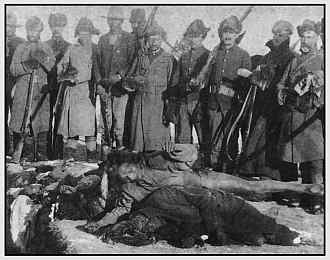By Patt Rall
“In this part of the world we cannot talk about the Holocaust without bringing up the problem of our treatment of Native Americans,” said Jenkinson during an interview earlier in the day. “I don’t think that our treatment of Native Americans was ever identical with the purposes of the Holocaust. In other words, I don’t believe that it was the policy of the United States government to insist on a systematic extermination of the Native American population; in fact, it is just the opposite.”
I'd say Jenkinson is playing games here. Sure, it wasn't a single policy; it was a long series of government decisions, court rulings, and treaties signed and broken. It wasn't the US government as a whole; it was individual presidents, Congresses, courts, Army officials, Indian agents, and especially state and local governments. It wasn't systematic, it was haphazard. It wasn't extermination in most cases, just eradication of the Indians' cultures and religions.
And...so? What I described isn't the opposite of genocide. It's an unofficial rather than official type of genocide. Indeed, it fits the United Nations' definition of genocide. If it's better than a single policy executed from a central government, that's cold comfort to the millions of Indians whose lives were destroyed.
The general theme of Jenkinson’s talk was on the Europeanization of this land (America) which started with Christopher Columbus because it was clear that Europeans wanted to take over the continent as effortlessly as possible, but as bloodthirstily as necessary. That varied from place to place and culture to culture. There was no way that Europeans were going to let native populations stand in their way. In fact, there have been attempts throughout American history to create reservations of the kind that Oklahoma was meant to be. But the de facto policy of white Europeans was that Indians could not be allowed to get in the way of white people’s dreams. That theme played itself out, over and over again, with different variations, Jenkinson said.
Rather, it stepped aside and let the people have their way. In violation of numerous laws and treaties, that is. Which makes the government guilty even if it didn't act.
When Person A breaks down your door and Person B enters your home and kills you, guess what? They're both guilty of the crime. There's no free pass because the government didn't actively seek to murder Indians. Knowingly creating the conditions for genocide is an integral part of genocide.
Any questions? I'm making this a Stereotype of the Month entry because of the way Jenkinson has downplayed the genocidal actions of the American governments (federal, state, and local) and people. Since the result was genocide according to the UN definition, someone (if not everyone) was guilty of it.
For more on the subject, see Documents Explain Bear River Massacre and Jefferson's Indian Removal Policy.


4 comments:
There has been documented accounts of the Third Reich stating its admiration for how the US Government dealt with the "Indian Problem" here in the Americas, so I don't see where any serious debate can be held regarding the comparisons of how Hitler modeled his treatment of Jews the same as how American policy dealt with its indigenous populations.
Going as far back as Columbus, where does one not see the same plunder for gold and its destruction of native peoples just as the same way Nazi Germany literally looted Jewish wealth and treasures? Am I missing something here?
One might argue the petty details and systematic differences between the two historic tragedies, but most of the details, like the boarding school and land acquisition are the same results.
I would even go so far to say that much of the systematic and cultural genocide are still in practice and use in both private and public sector America.
Americans like to say that they have nothing to do with the past transgressions of their nations corrupt past, but fail to see how much they benefit and reaped in terms of land ownership and opportunity compared to not only Americas first people, but other minorities as well.
Americans also like to point out "how much good" the country has done for the Indian, and blame the Indian for being the last one in line in terms of health, income, educational opportunities and economic development, but when small strides are made, then the Indian is given unfair advantage.
Systematic extermination still exists with voting rights, employment and educational opportunities, land resources are still being violated on Indian lands and violence against natives across the continent including Mexico and Canada as well.
I think this is sort of a problem all countries with this kind of history have. (Turkey pretty much denies having ever been in Armenia in the 20s.) But to say there's no organized effort in light of the mountain of evidence to the contrary is just insane.
Who is this Jenkinson? I'll have to look him up. He doesn't know American policy very well.
I've seen the document which states the Cherokee people shall be extermintated to extinction, and signed by Pres. Andrew Jackson's own hand. Where has Jenkinson been?
The article calls Jenkinson a "Humanities scholar." I don't know exactly what that means. He could be a professor, a historian, or an author.
Post a Comment